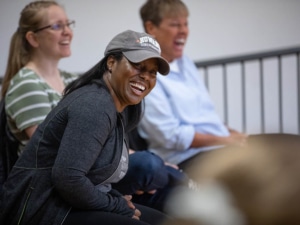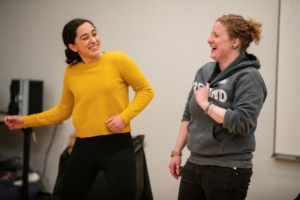DCPA NEWS CENTER
Enjoy the best stories and perspectives from the theatre world today.
Enjoy the best stories and perspectives from the theatre world today.
From the archives: this article was originally published on July 20, 2020
We live in fast paced, non-stop culture where we often forget to pause, take stalk of our lives, and make sure to throw a little “me” time in between the hustle and bustle of our everyday activities. In light of this predicament, the self-care movement has taken the world by storm, with numerous self-help books, promotion of meditation and mindfulness, as well as applications to track all kinds of habits.

DCPA Teaching Artist Jessica Austgen.
One of the more common improvements people try and make is to become more confident and self-assured by stretching themselves outside of their comfort zones and trying new things. Each year the Denver Center for the Performing Arts offers classes taught by professional actors and instructors to early 150,000 students. From musical theatre and acting classes to stage combat and trapeze, the Education department has something for all ages and abilities.
What if an improv class was one of the many steps in one’s self-care regimen? Improvisation is comedic in nature and often provides a life giving experience for those who participate. For individuals who struggle with low self-esteem, social anxiety, or other mental health issues, improv can help confront a variety of fears in a number of ways. The casual space encourages creativity and is free of judgement and fear of failure. At the same time, individuals are encouraged to express the thoughts and emotions they would otherwise hold back on a daily basis.
The impact of improv is never ending. Jessica Austgen, DCPA Teaching Artist says “Improvisation is basically recreating life under theatrical circumstances. Everything we look at in class illuminates a vital life-skill: listening, agreement, communication, specificity. I truly believe that improv benefits everyone who is interested in exploring their own humanity.”

DCPA Education Improv Class
For others, improv can help produce confidence in public speaking, improve communication skills and cooperation, and help people feel quicker on their feet during meetings and other social or professional settings. Improvisation is also a tool for self-awareness and can contribute to becoming a better listener and story-teller.
After 26 years of experience with Improv, Kerstin Caldwell, Denver Center Teaching Artist, says her relationship with the art form has shifted drastically from when she first encountered it in high school. “I learned that being funny got me attention,” she recalls, “and [improv] gave me a platform to be funny and use my skills.”
We often equate “improv” with comedy, and though comedy is often a part of the art, there is more involved both in the process and what participants can gain. The first dramatic shift for Caldwell came when she moved to Chicago to study and live the form full-time at iO (formerly improvOlympic) and The Second City. By diving into the art as a student of the craft, Caldwell learned the intricacies of it, which elevated her awareness into wanting to do this art a service by working to hone different muscles besides humor.
“When I started being more mindful of how I fit into the current reality my group and I were creating together, my world opened up and I expanded into a better version of myself,” Caldwell says. But even then, her learning continued to grow. During a workshop she took with the actor Alan Arkin, she discovered the principles of improv are actually tools of life that can make one’s individuality come through in each and every moment.

DCPA Education
“This concept opened my eyes and most importantly my heart to a completely new way of maneuvering as a human.” Caldwell’s love for the work transformed into teaching as she now encourages her students to allow the “inner five-year-old’ in them to lead the way both on and off stage.
This form of art is “playful” and the creative expression fosters healing and mental well-being through being silly. “Children are the most creative,” Caldwell says, “until they start believing the things they hear from the outside world.” For those not raised in an environment that fosters creativity, individuals often trade in imaginative play with responsibility.
Yet, our culture yearns for some part of our lives to reflect the inner five-year-old in each of us. Mass produced adult coloring books, paint and sip classes, the comeback of calligraphy, and the new bullet journal fad are just some examples. Improvisation is just another way to touch back into different activities that bring a sense of freedom, joy, and silliness to an otherwise “serious, adult life.”
So take a class, play some games, and get back in touch with your sense of play.
